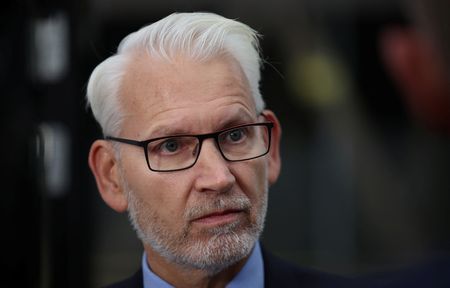By Vera Eckert and Tom Käckenhoff
BERLIN (Reuters) -More U.S. exports of liquefied natural gas (LNG) to Europe as called for by President Donald Trump will relieve tight global markets, reduce prices, and help traders diversify their supplies, the head of German utility Uniper said on Wednesday
“When Trump sends more gas to Europe it will reduce the world gas price,” chief executive Michael Lewis told Reuters.
“It means lower energy prices for German industry and customers, that’s why it’s positive,” he said in an interview during the Handelsblatt Energy Summit.
On his first day in office on Monday, Trump issued an order for the U.S. to resume processing export permit applications for new LNG projects which were halted by his predecessor Joe Biden.
However, the United States is currently exporting all the gas it can ship out and sending more would require a steep increase in production, something that will take time and could prove challenging given current low prices.
U.S. LNG has already helped make up for a significant part of supply lost when Germany stopped Russian pipeline imports on which it had long relied after Moscow’s invasion of Ukraine.
U.S. LNG accounted for 91% of imports at German regasification terminals in 2024, covering 9% of national gas usage in December, industry group BDEW said. In 2023, U.S. LNG made up 84% of imports, which in Dec. 2023 met 6.9% of demand.
While that percentage looks small, there was more unquantifiable U.S. gas within a 36.6% share of volumes received via northwest Europe, where LNG terminals deliver gas to Europe’s networks.
Uniper supplies 200 terawatt hours (TWh) of gas to German industry and utilities, covering a quarter of national demand.
It holds procurement contracts with U.S. firms Venture Global and ConocoPhillips.
LOW GAS STORAGE
Germany’s top gas importer and power plant operator, state-controlled Uniper also operates a quarter of Germany’s gas storage caverns, where filling levels of around 63% will last through the current winter.
But summer filling activity for 2025/26 was low, due to unattractively high storage fees Lewis said, warning of coming supply risks.
Storage operator Trading Hub Europe (THE), which also accounts for about 25% of Germany’s storage capacity, plans to start holding auctions on behalf of the government to remedy the situation as mandated during the 2022 energy crisis.
“THE has to … get the ball rolling,” Lewis said.
(Reporting by Vera Eckert and Tom Kaeckenhoff, editing by Rachel More and Tomasz Janowski)










